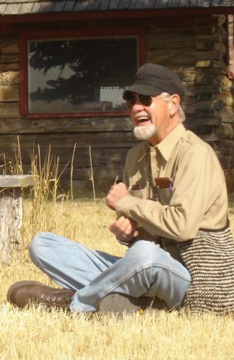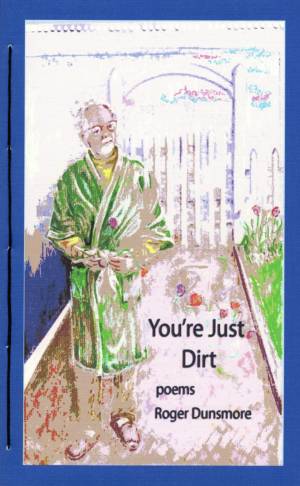Roger Dunsmore
You're Just Dirt
Roger Dunsmore
Montana Poets Series #1
Craig Czury, Editor
From the Preface
Roger Dunsmore was my first teacher and guide into the world of vision, silence and listening. His poems were the maps I followed as a young poet to show me what in life I should be looking at, what I should be listening to beyond the surface din, and how juxtaposed experiences throughout life and history speak simultaneously beyond memory.
After nearly 30 years, I still read Roger's poems as guy lines to steady my way of seeing and receiving the unexpected gifts of this world, naming the known, naming the unknown.
Craig Czury
Roger Dunsmore is no bardic yawper. He makes no pompous pronouncements from the mountaintops. Rather, these poems are the reminiscences of a wizened friend intimately sharing --in a quiet, compassionate voice--the world as he sees it. You're Just Dirt reminds the reader of our commonalities, our frailties, and our joys. In the title poem, Dunsmore examines the connectedness of “human-humus-humble.” Aren't we all people of the earth, though some of us have forgotten? These humble poems help us remember.
Lowell Jaeger, author of Suddenly, Out of a Long Sleep
You're Just Dirt-the culmination of more than forty years of poetic practice-reveals Roger Dunsmore as a true master whose work speaks explicitly to a particular place, this American West. Once again Roger brings us powerful poems revealing Montana's rich and dark history, beautiful lyrics celebrating the natural world and love between humans, poems in the voices of underdogs and outlaws, and fierce articulations of his understanding of Native American culture. Whether he is writing about prisoners in Deer Lodge, the flight of a hummingbird, moments of unbearable grief, a Sioux winter count, or the “patience of bears,” he offers us poems, rich in particulars and infinitely tender, that celebrate a shared humanity and sing the dailiness of a life that claims his most profound affection.
Rick Newby, author of The Suburb of Long Suffering
Whether it's in their compassion for animals--the wounded frogs and eagles, the treed lions, the electrocuted elephants, the road-killed flickers and jackrabbits--or their sympathy for the collaterally damaged civilians of the world's mines, junkyards and battlefields; these poems shine like turquoise washed by rain for a thousand years. They inform us that the dirt we hold in common makes us what we have to be: humus, humble and human--in that order.
Greg Keeler, author of Trash Fish: A Life
From the book:
YOU'RE JUST DIRT
(for Willie Brown)
When I put that old connection,
Latin, on the blackboard--
human-humus-humble
you mutter something in the Crow language:
When somebody is bragging themselves up
we have a saying,
“You're just dirt.”
Only it doesn't mean the same
as when white people say it-dirty.
It's like to be humble,
like that human, humus on the board.
And you want to know
if it's all right
to write about the river:
When we kill a deer
we cut it up into little pieces,
the parts that can't be eaten,
and feed it to the river,
entrails, legs, horn.
An old man talks to the river
with the children:
I give to you today, deer,
who gave to me,
so he may complete his journey.
We sing to the river, give thanks.
We want it to be strong.
The morning Elaine dies
you hear my voice break,
yours next to mine
softer than fawn skin.
You tell me:
The beads on this belt buckle
mean creation's fire
in all things.
And these black beads
spaced around the edge,
they're for the bad things.
That's part of it too.
Your voice, the morning Elaine dies,
telling me:
The earth is my body.
You're in sorry shape
if you can't feel it.
I never gave up
the earth.
ORION'S THIGH
A bear ambles smooth as butter
through the brush,
then suddenly gone.
Wasps harvesting the wealth
of this bear's droppings
permit me close enough
almost to touch--
the faint odor of berries,
white, whole ones
like fat pearls
in the scat.
I wander the afternoon away,
free a young aspen
that's caught its crotch
in the branch of a bush
that will split it apart
as it grows.
And watch a brace of bats
bring the stars out.
Resting against a log, I doze,
fall on my side,
raise my hand up
into Orion's thigh,
the Pleiades splitting
his heart ahead of him
like owls hoot
in the ripe, dark mass of night.
August, LaValle Creek
Roger Dunsmore (1938) grew up in small town farming communities in central Michigan until 1948, and then in Pittsburgh, Pa. He came from Pennsylvania State University to the University of Montana in 1963 to teach freshman composition., and continued on in the Humanities Program, 1964-2003. Dunsmore spent 1966-67 traveling solo in Europe (mostly Greece and Scotland, Scotland by bike). In 1967-68 he taught Humanities at Brescia College, a Catholic school run by Ursala nuns. He taught his first course in American Indian Literature, “Indian Autobiographies,” at UM, 1969. In 1971 he received his MFA in Creative Writing, UM, (poetry) under the guidance of Richard Hugo and Madeline DeFrees, and was a founding member of the Round River Experiment in Environmental Education. His first volume of poetry, On the Road to Sleeping Child Hotsprings, 1971, was reissued in a revised, enlarged editon, Pulp Press, 1977. From 1971-74 he built an octagonal, cedar-bark house with two friends on TV Mountain near Missoula, Mt. From 1976-2003 he taught in the Wilderness and Civilization Program of the Wilderness Institute in the Forestry School at the University of Montana. He published a twenty-five page essay/poem on the smashing of Michelangelo's Pieta, Laszlo Toth, 1977. In the summer of 1977 he taught prisoners and guards at the old territorial state prison in Deer Lodge, Mt. In 1983 and again in1987 he received NEH summer Fellowships to study American Indian Literature. Blood House, 1987, his second volume of poems, was selected by the Yellowstone Arts Center to “promote fine writing about the American West.” The title poem from his chapbook, The Sharp-shinned Hawk, 1987, was nominated by the KoYukon writer, Mary TallMoutain for a Pushcart Prize. During 1988-89 he was the Arizona Humanities Council's Scholar in Residence at the largest Indian high school in the U.S., at Tuba City, on the Navajo Reservation. In 1991 and again in 1997 he was the Exchange Fellow between the University of Montana and Shanghai International Studies University. His Earth's Mind: Essays in Native Literature was published by the University of New Mexico Press, 1997. In 2002, the University of Montana published The Poetics of Wilderness: the Proceedings of the 22nd Annual Wilderness Lecture Series, facilitated and edited by Dunsmore. A selection of poems from his third volume, Tiger Hill: China Poems, 2005 was awarded an Individual Artists Fellowship from the Montana Arts Council in 2001. After two years of retirement he resumed teaching Literature and Writing at University of Montana Western in Dillon. He has been short-listed twice to the governor for the position of Poet Laureate of Montana. His Roger Dunsmore's Greatest Hits, was published by PuddingHouse in 2007. Although he has spent forty-five years as a university professor, he takes pride in his teen years as a fundamentalist preacher, his two years in Naval Reserve Officers Training at Penn State, his college years as a waiter, his summer's work as a carpenter's helper, roofer, sheet rocker, stone mason's assistant, house painter and newspaper carrier. He is married to the poet, painter, and yoga teacher Jenni Fallein: between them they have five children and four grandchildren.

You're Just Dirt is a 108 page hand-stitched paper book with spine - $16.00
TO ORDER ON-LINE
From the US
From Canada
From Other Countries

